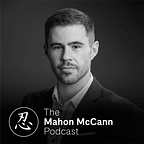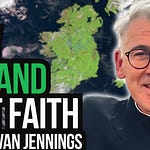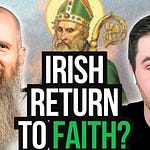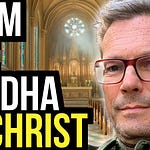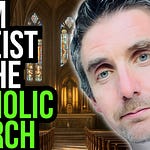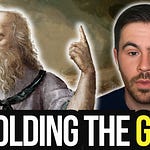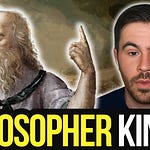Last week, I introduced the new ‘Meaning in life’ series on the Wisdom Dojo Substack. As promised, for this first week, we will be dealing with the dimension of meaning in life known as ‘Coherence’.
What is Coherence?
In the psychological literature on meaning in life, “coherence” refers to the sense that one’s life is structured, orderly, and makes sense. It involves the perception that various aspects of one’s life, such as goals, values, experiences, and relationships, fit together in a meaningful and integrated way. This coherence comes from a feeling that their actions and experiences are interconnected and contribute to a larger, meaningful narrative. Coherence is the ‘cognitive’ dimension of meaning in life, and boils down to life being meaningful to the extent that it “makes sense” to the person living it.
A key aspect of coherence is recognising patterns:
“Life is coherent when one is able to discern understandable patterns in it to make the wholeness comprehensible. In other words, meaning as coherence is seen to be about ‘the feeling that one’s experiences or life itself makes sense’” (Heintzelman & King, 2014b,p. 154).
They argue human beings have an adaptive trait that motivates us to aim to detect reliable patterns and connections in the environment and rewards us with an experience of ‘meaning’ when we can find such reliable coherence in our lives: a felt sense of perceiving reliable environmental patterns, the opposite of being awash with uncertainty and anxiety. Empirically, they have shown that encountering coherent patterns in the environment increases people’s self-reports of meaning in life (Heintzelman et al.,2013).
Conversely, individuals may struggle to find meaning when life lacks coherence and feels disjointed or chaotic.
A Lack of Coherence in Life
I’ve written a lot about the meaning crisis and the collapse of the religious worldview which homed us in the universe. The result of this loss of our homing worldview is an increase in lack of coherence, which leads to absurdity and possibly nihilism. A life without coherence is absurd, and much of life now for young people feels absurd by default, just look at our memes:
But is life really absurd?
Albert Camus, the Algerian/French philosopher, pursued the question of absurdity in life in the twentieth century, and he used the example of the Myth of Sisyphus to describe what he saw as the absurdity of human life:
In brief, Sisyphus was a Titan King of ancient Greece who killed a lot of his guests and so eventually ran afoul of the God-king Zeus. When Zeus sent death to go and bring Sisyphus to the underworld, Sisyphus, being a crafty guy, tricked Death into chaining himself up and, therefore escaped. However, the consequence of Sisyphus escaping death was that now no-one could die and stuff weird pretty, quick. Ares, the God of war, slayed whole armies on the battlefield and they just got up again. Nothing was working as it should, and sooner or later, Sisyphus was caught by Zeus himself (however he did manage to pull the same trick again!). So for his crime of hubris, believing he was smarter than the Gods, he was brought to the underworld and condemned to roll a boulder up a hill for all eternity, just to watch said boulder roll back down again. (This is how I feel doing the dishes every evening).
Camus used the myth of Sisyphus as a way of describing modern human life without a transcendent purpose, that death rendered all our actions absurd and, therefore we should rebel against death. It’s a depressing enough vision of the human condition and one which I find comparable to Macbeth in Shakespeare’s work when he says:
“Life's but a walking shadow; a poor player, that struts and frets his hour upon the stage, and then is heard no more: it is a tale told by an idiot, full of sound and fury, signifying nothing.”
William Shakespeare
This is the worldview of absurdity that inevitably leads to Nihilism. However it is important to note here that both Sisyphus and Macbeth, mythologically speaking, did something wrong - they committed crimes. What did they do wrong? They committed the crime of hubris, trying to become the equal or superior to the Gods. In other words, they wanted a level of power and control over reality that was simply impossible for a finite mortal human being to have, and in trying to attain this impossible goal, they broke the balance of reality for everyone else. Sisyphus chained death and as a result interrupted the natural cycle of life, and Macbeth killed the king and so created chaos in the social world of his day. So maybe, rather than absurdity being the lot of human beings, maybe absurdity is a part of life but also a punishment for our moral failings.
Make Facing Absurdity Meaningful Again
The fundamental question is - is life absurd? And the answer is sometimes.
Absurdity is the manifestation of uncertainty, chaos, the unknown - which for finite beings in an infinite world is more or less guaranteed. The Tyrant tries to destroy the unknown, to have absolute control, mythologically, to evade death. However, for mortal beings this is not possible and if the stories are to be believed, trying to do so incurs the wrath of the universe.
In the ultimate sceptic world, the individual is bereft of connection to reliable patterns and hence, completely incoherent, living a meaningless existence. If we lived in a world without order, it would be fundamentally absurd; there would be no reliable patterns to perceive or act upon, and we would be irreparably disconnected from reality. However, this is not the case; ultimate scepticism inevitably undermines itself because for ultimate scepticism to be true, we would need to be capable of perceiving at least that as truth. Even to say we can’t perceive any reliable patterns in the world would be to claim to be able to perceive the lack of reliable patterns in the world! It’s self-contradictory.
A more sensible alternative comes from Peterson’s framing of the Hero meta-mythology. The hero mythologically is the figure that stands between order and chaos, the known and the unknown worlds, and these are the two fundamental domains of human experience. There is order, a relatively predictable known world, and then there is chaos, a state of flux which is unpredictable and, therefore, dangerous and promising. The hero is the individual who voluntarily leaves behind the state of order, the world of the known, to enter into the unknown and face chaos, and to turn the chaos into habitable order for themselves, make sense out of the incoherence, and bring back this gold they found on the adventure, new information, to the village, the broader social world.
The hero stands at the border of order and chaos, which is also where ‘meaning’ occurs (which I wrote about in this essay). The experience of meaning in this case, is Csikszentmihalyi’s ‘flow-state’, a state of optimal consciousness and experience. Therefore the world of the hero is optimal for our sense of meaning in life and is as much about making coherence as having coherence. To have a completely predictable world would actually not be meaningful, as we need to be at the boundary of the unknown in order to experience meaningful flow states.
So the real meaning of coherence comes from making sense of the unknown, the absurdity - it occurs at the border of order and chaos. The cost of facing the unknown, the anxiety, the challenge, is the cost of creating more coherence in your life. My argument is that this is redemptive. Redemption comes from the Latin ‘redimere’ meaning ‘to buy back’. The cost of a meaningful life is experiencing the dramatic tension of living at the border of order and chaos. To return to the scientific literature, Heintzelman reported the experimental evidence that the act of making sense and finding coherence actually makes people experience their lives as more meaningful. So, in summary, the more coherent, intelligible things fit together for you, then the more meaningful you find your life.
ESSAY THREE:
Bibliography.
Heintzelman, S. J., Trent, J., & King, L. A. (2013). Encounters With Objective Coherence and the Experience of Meaning in Life. Psychological Science, 24(6), 991–998. https://doi-org.dcu.idm.oclc.org/10.1177/0956797612465878
Heintzelman, S. J. and King, L. A. (2014). Life is pretty meaningful.. American Psychologist, 69(6), 561-574. https://doi.org/10.1037/a0035049
Peterson, J.B. (1999). Maps of Meaning: The Architecture of Belief (1st ed.). Routledge. https://doi.org/10.4324/9780203902851
Csikszentmihalyi, M. (1990). Flow: The Psychology of Optimal Experience. Harper; Row.
Vervaeke, J. Meaning Crisis transcripts.
https://www.meaningcrisis.co/
Camus, A. (2000). The myth of Sisyphus (J. O'Brien, Trans.). Penguin Classics.

